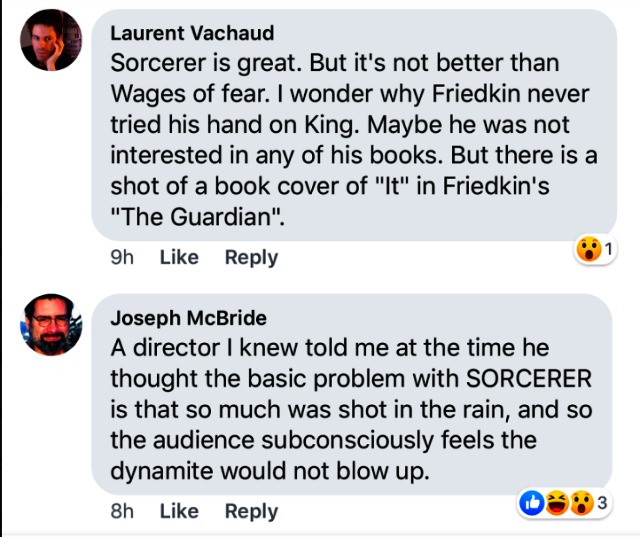[Originally posted on 4.13.14] I’ve never completely bought William Friedkin‘s theory that Sorcerer died because the hugely popular Star Wars, which opened on 5.25.77 (or a month before Friedkin’s film), had ushered in a sudden sea-change in mainstream cinematic appetites.
He meant that a new comic-book, popcorn-high attitude had taken over, and had brought about a consequential lessening of interest in gritty, noirish, character-driven adult dramas.
Sorcerer, of course, was never going to be a hugely commercial thing. It’s a fairly downbeat, men-against-the-elements adventure flick made for guys. Women don’t go for sweaty, atmospheric, end-of-the-road Latin American fatalism. But I suspect that Sorcerer would have been at least a modest success if it had delivered a sense of justice in the case of Roy Scheider‘s character, a wise guy on the run from the New Jersey mob.

Sorcerer is about four desperate men hired to deliver nitroglycerin in trucks to a burning oil well in the middle of the South American jungle. Scheider is the only one who makes it in the end. He’s gone through hell, and despite his previous criminal inclinations, the audience has been taught to respect him for getting through this terrible ordeal. They may not love him, but he’s done a really tough thing and earned, in movie-story terms, a kind of redemption. A little peace and gratification.
But then Friedkin and screenwriter Walon Green turn around and stab Scheider with an icepick. Mob assassins (accompanied by a friend who had helped him escape the country and who has now obviously betrayed him) arrive at the very end to rub him out, and there’s no escape.
Yeah, yeah, I know — that’s what “noir” is. Life is hard and cruel and then you die. But that’s not how audiences see it.
I felt this way when I first saw Sorcerer, and I felt it again last night. Scheider doesn’t deserve death — he’s earned a chance to live again and maybe do things right for the first time in his life. But Sorcerer rejects this notion, and that’s why audiences rejected it. It left a sour taste by (a) making it clear that Scheider’s scummy, low-life character is possessed by fierce determination and concentration and courage, and then (b) zotzing him anyway. That’s a kind of “fuck you” to the audience, a kind of a burn.
This, trust me, is a major reason why Sorcerer screwed the pooch. A movie doesn’t have to end happily or sadly, but it does have to end on a note of justice.
